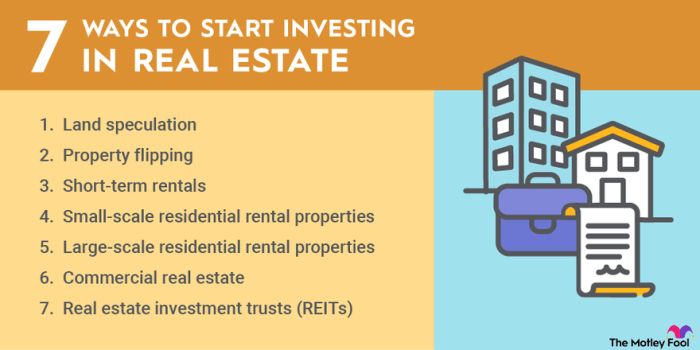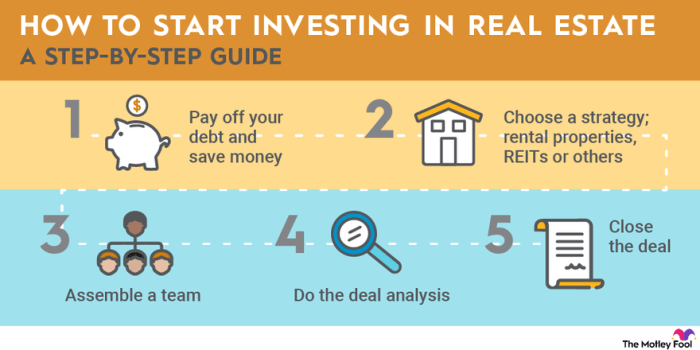Embark on a journey into the world of real estate investment with our guide on How to Invest in Real Estate: 10 Tips for Beginners. This informative piece is designed to equip you with essential knowledge and insights for a successful start in the real estate market.
From understanding the basics to practical tips, this guide covers everything you need to know to kickstart your real estate investment journey.
Understanding Real Estate Investment

Real estate investment involves purchasing, owning, managing, renting, or selling properties for profit. It is a popular way to build wealth and generate passive income over time.
Types of Real Estate Investments
There are several types of real estate investments, including:
- Residential: Properties like single-family homes, apartments, or vacation rentals.
- Commercial: Buildings used for businesses, such as offices, retail spaces, or warehouses.
- Industrial: Properties like factories, warehouses, or distribution centers.
Risks of Real Estate Investment
While real estate can be a lucrative investment, there are also risks involved, such as:
- Market fluctuations: The value of properties can go up or down based on market conditions.
- Maintenance and upkeep costs: Properties require regular maintenance, repairs, and updates.
- Vacancy and tenant issues: Finding and retaining good tenants can be a challenge.
Comparison with Other Investments
Real estate investment differs from other forms of investment like stocks and bonds in several ways:
- Real estate is a tangible asset that you can see and touch, unlike stocks or bonds.
- Real estate can provide a steady income through rent payments, while stocks pay dividends and bonds pay interest.
- Real estate can offer tax advantages, such as deductions for mortgage interest and property taxes.
Getting Started in Real Estate Investment

Investing in real estate can be a lucrative venture, offering a variety of benefits such as passive income, tax advantages, and portfolio diversification. Before diving into the world of real estate investment, it’s essential to lay a solid foundation and understand the key steps to get started.
Identify the reasons for investing in real estate.
- Real estate offers a tangible asset that tends to appreciate over time, providing a hedge against inflation.
- Rental income from properties can generate a steady cash flow, creating a passive income stream.
- Tax benefits such as deductions for mortgage interest, property taxes, and depreciation can lead to significant savings.
Research and select a suitable investment strategy
- Consider different strategies such as rental properties, fix and flip, or real estate investment trusts (REITs) based on your financial goals and risk tolerance.
- Understand the pros and cons of each strategy to choose the one that aligns best with your investment objectives.
Discuss the importance of setting investment goals and creating a budget.
- Define clear investment goals, whether it’s generating passive income, long-term wealth accumulation, or retirement planning.
- Create a budget that Artikels your financial resources, investment capital, and expenses to ensure you stay within your means.
- Setting specific, measurable, achievable, relevant, and time-bound (SMART) goals can help you track your progress and make informed investment decisions.
Explain how to evaluate potential properties for investment.
- Conduct thorough market research to identify locations with high demand and growth potential.
- Evaluate the property’s condition, rental income potential, expenses, and overall return on investment (ROI) before making a purchase decision.
- Consider factors such as property appreciation, rental yield, vacancy rates, and potential renovation costs to assess the profitability of the investment.
Financing Real Estate Investments

When it comes to investing in real estate, understanding the various financing options available is crucial for success. From traditional mortgages to hard money loans and seller financing, each option comes with its own set of pros and cons.
Types of Financing Options
There are several financing options you can consider when investing in real estate:
- Traditional Mortgages: These are long-term loans offered by banks or financial institutions to purchase a property.
- Hard Money Loans: Short-term loans provided by private investors or companies, typically with higher interest rates.
- Seller Financing: When the seller of the property acts as the lender and finances the purchase instead of a traditional financial institution.
Importance of Credit Scores and Financial Stability
Having a good credit score and financial stability is essential when seeking financing for real estate investments. Lenders will consider these factors to determine your eligibility and the terms of the loan.
Remember, maintaining a strong credit score and stable financial position can help you secure better financing terms and lower interest rates.
Pros and Cons of Using Leverage
Using leverage, or borrowing money to finance a real estate investment, can amplify your returns but also increase risks. It’s important to weigh the pros and cons before deciding to use leverage in your investment strategy.
- Pros of Using Leverage: Increased potential for higher returns, ability to invest in more properties with less capital.
- Cons of Using Leverage: Higher risk due to debt obligations, potential losses if the market declines.
Tips for Negotiating Favorable Financing Terms
When negotiating financing terms for your real estate investment, consider the following tips:
- Shop around and compare offers from different lenders to find the best terms.
- Improve your credit score and financial stability to qualify for better rates and terms.
- Negotiate for lower interest rates, reduced fees, or flexible repayment options.
Last Recap

In conclusion, mastering the art of real estate investment is within reach with the right guidance and knowledge. Use these valuable tips to make informed decisions and pave your way to financial success in the real estate industry.